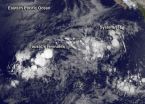(Press-News.org) Cellphone metadata has been in the news quite a bit lately, but the National Security Agency isn't the only organization that collects information about people's online behavior. Newly downloaded cellphone apps routinely ask to access your location information, your address book, or other apps, and of course, websites like Amazon or Netflix track your browsing history in the interest of making personalized recommendations.
At the same time, a host of recent studies have demonstrated that it's shockingly easy to identify unnamed individuals in supposedly "anonymized" data sets, even ones containing millions of records. So, if we want the benefits of data mining — like personalized recommendations or localized services — how can we protect our privacy?
In the latest issue of PLOS ONE, MIT researchers offer one possible answer. Their prototype system, openPDS — short for personal data store — stores data from your digital devices in a single location that you specify: It could be an encrypted server in the cloud, but it could also be a computer in a locked box under your desk. Any cellphone app, online service, or big-data research team that wants to use your data has to query your data store, which returns only as much information as is required.
Sharing code, not data
"The example I like to use is personalized music," says Yves-Alexandre de Montjoye, a graduate student in media arts and sciences and first author on the new paper. "Pandora, for example, comes down to this thing that they call the music genome, which contains a summary of your musical tastes. To recommend a song, all you need is the last 10 songs you listened to — just to make sure you don't keep recommending the same one again — and this music genome. You don't need the list of all the songs you've been listening to."
With openPDS, de Montjoye says, "You share code; you don't share data. Instead of you sending data to Pandora, for Pandora to define what your musical preferences are, it's Pandora sending a piece of code to you for you to define your musical preferences and send it back to them."
De Montjoye is joined on the paper by his thesis advisor, Alex "Sandy" Pentland, the Toshiba Professor of Media Arts and Sciences; Erez Shmueli, a postdoc in Pentland's group; and Samuel Wang, a software engineer at Foursquare who was a graduate student in the Department of Electrical Engineering and Computer Science when the research was done.
After an initial deployment involving 21 people who used openPDS to regulate access to their medical records, the researchers are now testing the system with several telecommunications companies in Italy and Denmark. Although openPDS can, in principle, run on any machine of the user's choosing, in the trials, data is being stored in the cloud.
Meaningful permissions
One of the benefits of openPDS, de Montjoye says, is that it requires applications to specify what information they need and how it will be used. Today, he says, "when you install an application, it tells you 'this application has access to your fine-grained GPS location,' or it 'has access to your SD card.' You as a user have absolutely no way of knowing what that means. The permissions don't tell you anything."
In fact, applications frequently collect much more data than they really need. Service providers and application developers don't always know in advance what data will prove most useful, so they store as much as they can against the possibility that they may want it later. It could, for instance, turn out that for some music listeners, album cover art turns out to be a better predictor of what songs they'll like than anything captured by Pandora's music genome.
OpenPDS preserves all that potentially useful data, but in a repository controlled by the end user, not the application developer or service provider. A developer who discovers that a previously unused bit of information is useful must request access to it from the user. If the request seems unnecessarily invasive, the user can simply deny it.
Of course, a nefarious developer could try to game the system, constructing requests that elicit more information than the user intends to disclose. A navigation application might, for instance, be authorized to identify the subway stop or parking garage nearest the user. But it shouldn't need both pieces of information at once, and by requesting them, it could infer more detailed location information than the user wishes to reveal.
Creating safeguards against such information leaks will have to be done on a case-by-case, application-by-application basis, de Montjoye acknowledges, and at least initially, the full implications of some query combinations may not be obvious. But "even if it's not 100 percent safe, it's still a huge improvement over the current state," he says. "If we manage to get people to have access to most of their data, and if we can get the overall state of the art to move from anonymization to interactive systems, that would be such a huge win."
INFORMATION:
Related links
How hard is it to 'de-anonymize' cellphone data?: http://newsoffice.mit.edu/2013/how-hard-it-de-anonymize-cellphone-data
Take control of your phone's sensors:
http://newsoffice.mit.edu/2011/phone-sensor-programming-1005
New system would give individuals more control over shared digital data
A new system would allow individuals to pick and choose what data to share with websites and mobile apps
2014-07-09
ELSE PRESS RELEASES FROM THIS DATE:
NASA, NOAA satellites help confirm Tropical Storm Fausto as a remnant low
2014-07-09
NOAA's GOES-West and NASA-JAXA's Global Precipitation Measurement or GPM mission satellite helped forecasters at the National Hurricane Center determine that what was once Tropical Storm Fausto is now a remnant area of low pressure in the Eastern Pacific Ocean.
Forecaster Beven at the National Hurricane Center (NHC) noted that "satellite imagery, overnight scatterometer data, and a recent GPM satellite microwave overpass indicate that Fausto has degenerated to a trough of low pressure."
On July 9 at 1500 UTC (11 a.m. EDT) Fausto's circulation was no longer apparent ...
Study identifies novel genomic changes in the most common type of lung cancer
2014-07-09
Researchers from The Cancer Genome Atlas (TCGA) Research Network have identified novel mutations in a well-known cancer-causing pathway in lung adenocarcinoma, the most common subtype of lung cancer. Knowledge of these genomic changes may expand the number of possible therapeutic targets for this disease and potentially identify a greater number of patients with treatable mutations because many potent cancer drugs that target these mutations already exist.
TCGA is jointly funded and managed by the National Cancer Institute (NCI) and the National Human Genome Research ...
Study cracks how the brain processes emotions
2014-07-09
ITHACA, N.Y. – Although feelings are personal and subjective, the human brain turns them into a standard code that objectively represents emotions across different senses, situations and even people, reports a new study by Cornell University neuroscientist Adam Anderson.
"We discovered that fine-grained patterns of neural activity within the orbitofrontal cortex, an area of the brain associated with emotional processing, act as a neural code which captures an individual's subjective feeling," says Anderson, associate professor of human development in Cornell's College ...
Bacteria hijack plentiful iron supply source to flourish
2014-07-09
In an era of increasing concern about the prevalence of antibiotic-resistant illness, Case Western Reserve researchers have identified a promising new pathway to disabling disease: blocking bacteria's access to iron in the body.
The scientists showed how bacterial siderophore, a small molecule, captures iron from two abundant supply sources to fan bacterial growth — as well as how the body launches a chemical counterassault against this infection process. Their findings appear in a recent edition of The Journal of Experimental Medicine.
"Bacterial siderophore will be ...
Climate change provides good growing conditions for charcoal rot in soybeans
2014-07-09
URBANA, Ill. – With over 100 diseases that can attack soybean crops, why would charcoal rot rise to the top of the most wanted list? University of Illinois scientists cite the earth's changing climate as one reason that more research is needed on the fungus that causes charcoal rot.
Fungi may often be associated with cool, damp growing conditions but Macrophomina phaseolina, the fungus that causes charcoal rot, prefers hot and dry drought conditions.
"As the climate continues to change and we see more extremes in the weather, including hotter, drier summers, this fungus ...
Biologists link sexual selection and placenta formation
2014-07-09
RIVERSIDE, Calif. — Sexual selection refers to species' selection for traits that are attractive to the opposite sex. This special type of natural selection enhances opportunities to mate, the tail of male peacocks being an iconic example.
Biologists at the University of California, Riverside have now found that sexual selection and "placentation" — the formation of a placenta — are linked. Describing the life histories of more than 150 species of fish in the family Poeciliidae, the researchers found that species with placentas tend to have males that do not have bright ...
USF study: Amphibians can acquire resistance to deadly fungus
2014-07-09
Tampa, Fla. (July 9, 2014) – Emerging fungal pathogens pose a greater threat to biodiversity than any other parasitic group, causing population declines of amphibians, bats, corals, bees and snakes. New research from the University of South Florida published in the prestigious journal Nature reveals that amphibians can acquire behavioral or immunological resistance to a deadly chytrid fungus implicated in global amphibian population declines.
"Acquired resistance is important because it is the basis of vaccination campaigns based on 'herd immunity', where immunization ...
Fox Chase researchers recommend updating the staging criteria for breast cancer diagnoses
2014-07-09
New findings from Fox Chase Cancer Center paint a relatively optimistic picture of women's chances of surviving a subset of breast cancers that have spread to the chest wall or skin, but not beyond.
Tumors that grow into the skin, regardless of size and whether they have involved lymph nodes, are automatically classified as stage III – and called "locally advanced" tumors, suggesting that they are a relatively serious form of cancer, often with poor survival. Locally advanced breast cancers of this and other types account for five to ten percent of new breast cancer ...
MyChart use skyrocketing among cancer patients, UT Southwestern study finds
2014-07-09
DALLAS – July 9, 2014 – There has been a sharp increase in the number of cancer patients at UT Southwestern Medical Center using MyChart, the online, interactive service that allows patients to view laboratory and radiology results, communicate with their healthcare providers, schedule appointments, and renew prescriptions.
Over a six-year period, the number of patients actively using MyChart each year increased five-fold, while the number of total logins each year increased more than 10-fold, according to a study by Dr. David Gerber, Associate Professor of Internal Medicine, ...
New study finds that Adélie penguin population is on the rise
2014-07-09
A first-ever global census of Adélie penguins shows that the population is 3.79 million breeding pairs or 53 percent larger than previously estimated. Adélie penguins have long been considered a key indicator species to monitor and understand the effects of climate change and fishing in the Southern Ocean.
By using high-resolution satellite imagery, researchers from Stony Brook University and University of Minnesota have applied a new method that permits regular monitoring of Adélie penguins across their entire breeding range, and by extension the health of the Southern ...
LAST 30 PRESS RELEASES:
Alkali cation effects in electrochemical carbon dioxide reduction
Test platforms for charging wireless cars now fit on a bench
$3 million NIH grant funds national study of Medicare Advantage’s benefit expansion into social supports
Amplified Sciences achieves CAP accreditation for cutting-edge diagnostic lab
Fred Hutch announces 12 recipients of the annual Harold M. Weintraub Graduate Student Award
Native forest litter helps rebuild soil life in post-mining landscapes
Mountain soils in arid regions may emit more greenhouse gas as climate shifts, new study finds
Pairing biochar with other soil amendments could unlock stronger gains in soil health
Why do we get a skip in our step when we’re happy? Thank dopamine
UC Irvine scientists uncover cellular mechanism behind muscle repair
Platform to map living brain noninvasively takes next big step
Stress-testing the Cascadia Subduction Zone reveals variability that could impact how earthquakes spread
We may be underestimating the true carbon cost of northern wildfires
Blood test predicts which bladder cancer patients may safely skip surgery
Kennesaw State's Vijay Anand honored as National Academy of Inventors Senior Member
Recovery from whaling reveals the role of age in Humpback reproduction
Can the canny tick help prevent disease like MS and cancer?
Newcomer children show lower rates of emergency department use for non‑urgent conditions, study finds
Cognitive and neuropsychiatric function in former American football players
From trash to climate tech: rubber gloves find new life as carbon capturers materials
A step towards needed treatments for hantaviruses in new molecular map
Boys are more motivated, while girls are more compassionate?
Study identifies opposing roles for IL6 and IL6R in long-term mortality
AI accurately spots medical disorder from privacy-conscious hand images
Transient Pauli blocking for broadband ultrafast optical switching
Political polarization can spur CO2 emissions, stymie climate action
Researchers develop new strategy for improving inverted perovskite solar cells
Yes! The role of YAP and CTGF as potential therapeutic targets for preventing severe liver disease
Pancreatic cancer may begin hiding from the immune system earlier than we thought
Robotic wing inspired by nature delivers leap in underwater stability
[Press-News.org] New system would give individuals more control over shared digital dataA new system would allow individuals to pick and choose what data to share with websites and mobile apps






